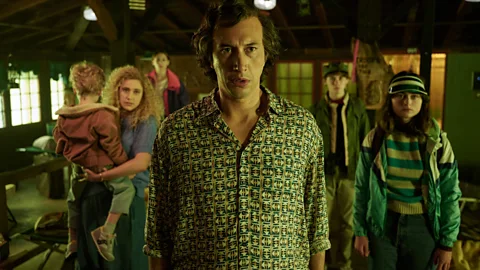White Noise is 'thrillingly original'
 Netflix
NetflixThe Venice Film Festival has opened with Noah Baumbach's latest, which stars Adam Driver as a bumbling college professor-turned-action hero. It could be his best role yet, writes Nicholas Barber.
It seems like no time at all since Adam Driver was playing the embodiment of cocky youth in Noah Baumbach's While We're Young (2014). But one of the great things about Baumbach's films is that as he gets older, his angst-ridden characters get older, too: with each new project he shines a light on the worries of another age bracket. In his brutal 2019 divorce drama, Marriage Story, Driver played a director who wasn't a hip young flavour-of-the-month any more. And now, in Baumbach's latest brilliant comedy, which opened the Venice Film Festival, Driver is middle-age incarnate: a university professor with thinning hair, a thickening waistband, and a looming awareness that he might be closer to death than birth. The role suits him so beautifully that awards nominations should be heading his way.
More like this:
- 11 of the best films to watch this September
Adapted from Don DeLillo's 1985 novel, White Noise is set in and around a thriving Midwestern college campus in the early 1980s. Driver plays one of its most valued staff , JAK "Jack" Gladney, who teaches "advanced Nazism". Blessed with the off-kilter charisma of Jeff Goldblum, he is adored by his students and hero-worshipped by his cheerful colleague Murray (Don Cheadle), who wants to be as well-known for his Elvis Presley studies as Jack is for his Hitler studies. At home, Jack is happily in love with his sunny wife Babette, played by Greta Gerwig, whose mass of blonde curls must have been modelled on Nicole Kidman's hairdo circa BMX Bandits. And they dote on their four intelligent children from this marriage and several previous ones (two of their offspring are played by Emily Mortimer and Alessandro Nivola's children, Sam and May Nivola). "Life is good, Jack," muses Babette. But maybe it's not perfect.
Babette is becoming forgetful, perhaps as a result of the mysterious pills she is taking. And Jack is concerned that, with a big Hitler studies conference coming up, his peers might discover that he can't actually speak German. Then comes a proper crisis: a lorry-load of highly toxic chemicals explodes near their town, sending an apocalyptic black cloud into the sky. Once the authorities upgrade this cloud to an "airborne toxic event", Jack discovers that his scholarly confidence and his taste for neurotically precise debate might not be enough to deal with the situation: discussing whether the horrifying "event" should be described as a "feathery" or "billowing" probably won't help him survive it. In essence, he's in the wrong film. He should be in an art-house college comedy, and suddenly he's in a Hollywood disaster movie, complete with ominous government announcements, overrun evacuation centres, and roads jammed with traffic all the way to the horizon. He's a Woody Allen character in a scenario that demands a Tom Cruise.
White Noise
Directed by: Noah Baumbach
Starring: Adam Driver, Greta Gerwig, Don Cheadle
Film length: 2 hr 16m
Jack's bumbling efforts to be an action hero can be hilarious, but White Noise is more than just a shrewd parody of academic bumptiousness and mega-budget movie-making. A sophisticated, thrillingly original, and sometimes bewildering sprawl of a film, it's a sharp commentary on misinformation and consumerism, and it's a postmodern adaptation of a postmodern novel. The characters speak in formal, epigrammatic dialogue (which takes some getting used to), the bright colours and artificiality recall Wes Anderson, and, rather than having one over-arching plot, White Noise has at least two of them: just as Jack gets the hang of being in a disaster movie, he's shunted into a conspiracy thriller - and he's comically inept in that, too. Still, despite all his highbrow and lowbrow game-playing, Baumbach ensures that the Gladneys are human enough to care about. Their world and their dialogue might be heightened, but their sense of dread and helplessness are poignantly real.
Beyond that... well, White Noise has so much crammed into its two-and-a-quarter hours that it will take multiple viewings to unpack it all. Luckily, it's all so entertaining that the prospect of those multiple viewings is an enticing one indeed.
★★★★☆
White Noise is released on Netflix in the US on 25 November.
Love film and TV? BBC Culture Film and TV Club on Facebook, a community for cinephiles all over the world.
If you would like to comment on this story or anything else you have seen on BBC Culture, head over to our Facebook page or message us on Twitter.
And if you liked this story, sign up for the weekly bbc.com features newsletter, called The Essential List. A handpicked selection of stories from BBC Future, Culture, Worklife and Travel, delivered to your inbox every Friday
